高中英语状语从句练习与讲解
- 格式:doc
- 大小:49.50 KB
- 文档页数:5
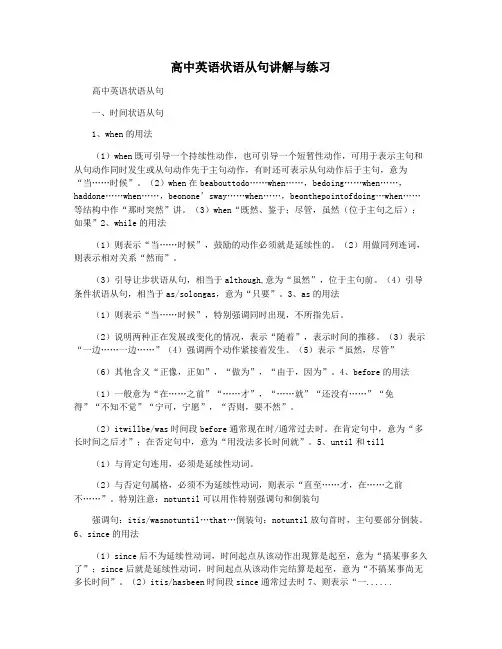
高中英语状语从句讲解与练习高中英语状语从句一、时间状语从句1、when的用法(1)when既可引导一个持续性动作,也可引导一个短暂性动作,可用于表示主句和从句动作同时发生或从句动作先于主句动作,有时还可表示从句动作后于主句,意为“当……时候”。
(2)when在beabouttodo……when……,bedoing……when……,haddone……when……,beonone’sway……when……,beonthepointofdoing…when……等结构中作“那时突然”讲。
(3)when“既然、鉴于;尽管,虽然(位于主句之后);如果”2、while的用法(1)则表示“当……时候”,鼓励的动作必须就是延续性的。
(2)用做同列连词,则表示相对关系“然而”。
(3)引导让步状语从句,相当于although,意为“虽然”,位于主句前。
(4)引导条件状语从句,相当于as/solongas,意为“只要”。
3、as的用法(1)则表示“当……时候”,特别强调同时出现,不所指先后。
(2)说明两种正在发展或变化的情况,表示“随着”,表示时间的推移。
(3)表示“一边……一边……”(4)强调两个动作紧接着发生。
(5)表示“虽然,尽管”(6)其他含义“正像,正如”,“做为”,“由于,因为”。
4、before的用法(1)一般意为“在……之前”“……才”,“……就”“还没有……”“免得”“不知不觉”“宁可,宁愿”,“否则,要不然”。
(2)itwillbe/was时间段before通常现在时/通常过去时。
在肯定句中,意为“多长时间之后才”;在否定句中,意为“用没法多长时间就”。
5、until和till(1)与肯定句连用,必须是延续性动词。
(2)与否定句属格,必须不为延续性动词,则表示“直至……才,在……之前不……”。
特别注意:notuntil可以用作特别强调句和倒装句强调句:itis/wasnotuntil…that…倒装句:notuntil放句首时,主句要部分倒装。
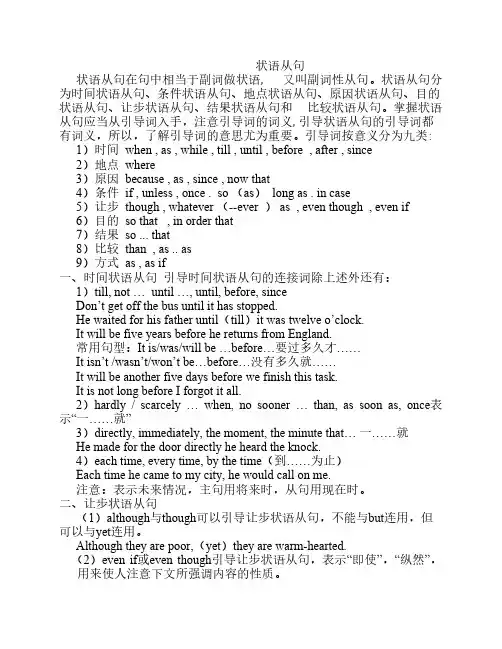
状语从句状语从句在句中相当于副词做状语, 又叫副词性从句。
状语从句分为时间状语从句、条件状语从句、地点状语从句、原因状语从句、目的状语从句、让步状语从句、结果状语从句和 比较状语从句。
掌握状语从句应当从引导词入手,注意引导词的词义,引导状语从句的引导词都有词义,所以,了解引导词的意思尤为重要。
引导词按意义分为九类: 1)时间 when , as , while , till , until , before , after , since2)地点 where3)原因 because , as , since , now that4)条件 if , unless , once . so (as) long as . in case5)让步 though , whatever (--ever ) as , even though , even if6)目的 so that , in order that7)结果 so ... that8)比较 than , as .. as9)方式 as , as if一、时间状语从句引导时间状语从句的连接词除上述外还有:1)till, not … until …, until, before, sinceDon’t get off the bus until it has stopped.He waited for his father until(till)it was twelve o’clock.It will be five years before he returns from England.常用句型:It is/was/will be …before…要过多久才……It isn’t /wasn’t/won’t be…before…没有多久就……It will be another five days before we finish this task.It is not long before I forgot it all.2)hardly / scarcely … when, no sooner … than, as soon as, once表示“一……就”3)directly, immediately, the moment, the minute that… 一……就He made for the door directly he heard the knock.4)each time, every time, by the time(到……为止)Each time he came to my city, he would call on me.注意:表示未来情况,主句用将来时,从句用现在时。
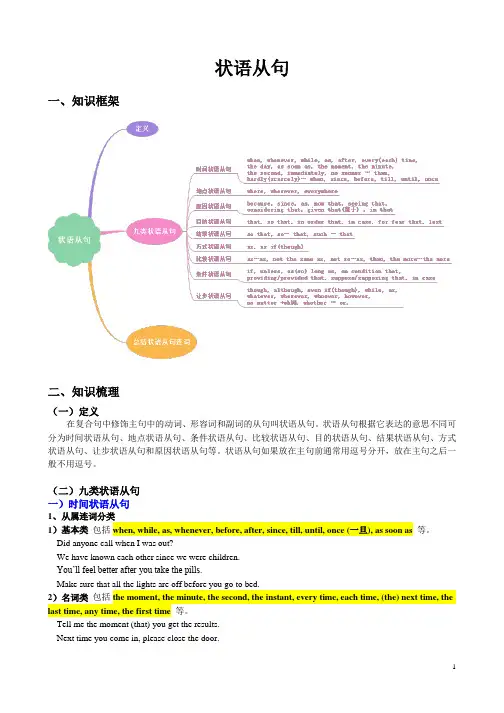
状语从句一、知识框架二、知识梳理(一)定义在复合句中修饰主句中的动词、形容词和副词的从句叫状语从句。
状语从句根据它表达的意思不同可分为时间状语从句、地点状语从句、条件状语从句、比较状语从句、目的状语从句、结果状语从句、方式状语从句、让步状语从句和原因状语从句等。
状语从句如果放在主句前通常用逗号分开,放在主句之后一般不用逗号。
(二)九类状语从句一)时间状语从句1、从属连词分类1)基本类包括when, while, as, whenever, before, after, since, till, until, once (一旦), as soon as等。
Did anyone call when I was out?We have known each other since we were children.You’ll feel better after you take the pills.Make sure that all the lights are off before you go to bed.2)名词类包括the moment, the minute, the second, the instant, every time, each time, (the) next time, the last time, any time, the first time等。
Tell me the moment (that) you get the results.Next time you come in, please close the door.He felt nervous each time she spoke to him.The last time we talked he said he needed another two days.3)副词类如immediately, directly, instantly, presently等。
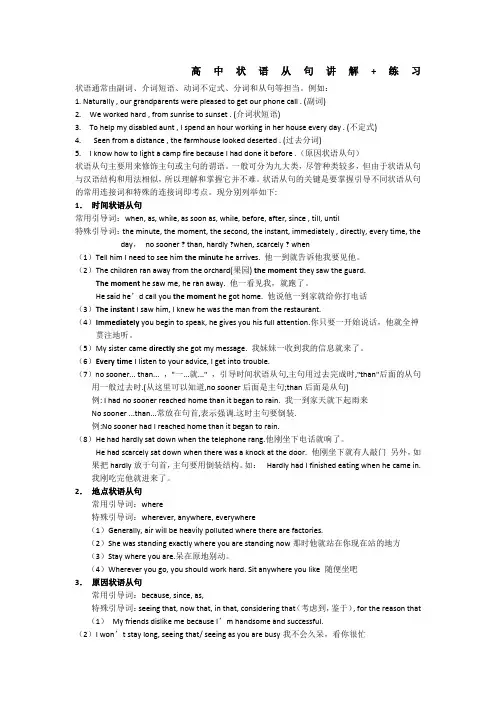
高中状语从句讲解+练习状语通常由副词、介词短语、动词不定式、分词和从句等担当。
例如:1. Naturally , our grandparents were pleased to get our phone call . (副词)2. We worked hard , from sunrise to sunset . (介词状短语)3. To help my disabled aunt , I spend an hour working in her house every day . (不定式)4. Seen from a distance , the farmhouse looked deserted . (过去分词)5. I know how to light a camp fire because I had done it before .(原因状语从句)状语从句主要用来修饰主句或主句的谓语。
一般可分为九大类,尽管种类较多,但由于状语从句与汉语结构和用法相似,所以理解和掌握它并不难。
状语从句的关键是要掌握引导不同状语从句的常用连接词和特殊的连接词即考点。
现分别列举如下:1.时间状语从句常用引导词:when, as, while, as soon as, while, before, after, since , till, until特殊引导词:the minute, the moment, the second, the instant, immediately , directly, every time, the day,no sooner ? than, hardly ?when, scarcely ? when(1)Tell him I need to see him the minute he arrives. 他一到就告诉他我要见他。
(2)The children ran away from the orchard(果园) the moment they saw the guard.The moment he saw me, he ran away. 他一看见我,就跑了。
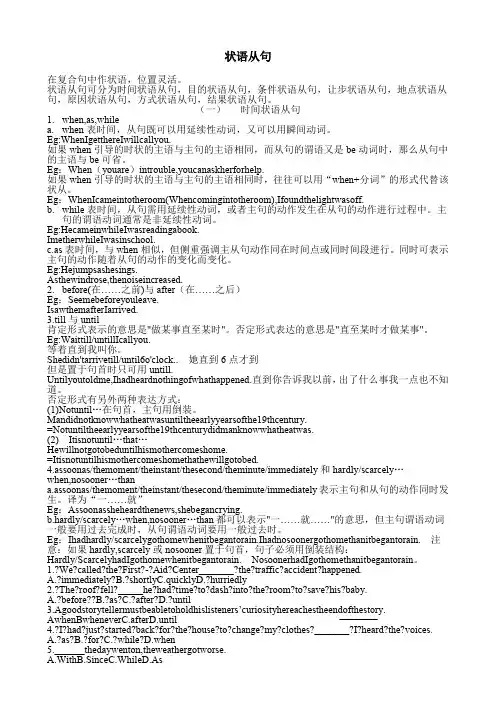
状语从句在复合句中作状语,位置灵活。
状语从句可分为时间状语从句,目的状语从句,条件状语从句,让步状语从句,地点状语从句,原因状语从句,方式状语从句,结果状语从句。
(一)时间状语从句1.when,as,whilea.when表时间,从句既可以用延续性动词,又可以用瞬间动词。
Eg:WhenIgetthereIwillcallyou.如果when引导的时状的主语与主句的主语相同,而从句的谓语又是be动词时,那么从句中的主语与be可省。
Eg:When(youare)introuble,youcanaskherforhelp.如果when引导的时状的主语与主句的主语相同时,往往可以用“when+分词”的形式代替该状从。
Eg:WhenIcameintotheroom(Whencomingintotheroom),Ifoundthelightwasoff.b.while表时间,从句需用延续性动词,或者主句的动作发生在从句的动作进行过程中。
主句的谓语动词通常是非延续性动词。
Eg:HecameinwhileIwasreadingabook.ImetherwhileIwasinschool.c.as表时间,与when相似,但侧重强调主从句动作同在时间点或同时间段进行。
同时可表示主句的动作随着从句的动作的变化而变化。
Eg:Hejumpsashesings.Asthewindrose,thenoiseincreased.2.before(在……之前)与after(在……之后)Eg:Seemebeforeyouleave.IsawthemafterIarrived.3.till与until肯定形式表示的意思是"做某事直至某时"。
否定形式表达的意思是"直至某时才做某事"。
Eg:Waittill/untillIcallyou.等着直到我叫你。
Shedidn'tarrivetill/until6o'clock..她直到6点才到但是置于句首时只可用untill.Untilyoutoldme,Ihadheardnothingofwhathappened.直到你告诉我以前,出了什么事我一点也不知道。
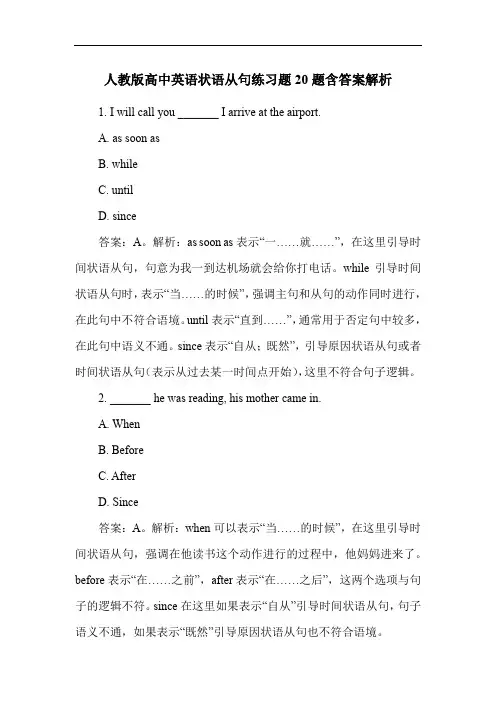
人教版高中英语状语从句练习题20题含答案解析1. I will call you _______ I arrive at the airport.A. as soon asB. whileC. untilD. since答案:A。
解析:as soon as表示“一……就……”,在这里引导时间状语从句,句意为我一到达机场就会给你打电话。
while引导时间状语从句时,表示“当……的时候”,强调主句和从句的动作同时进行,在此句中不符合语境。
until表示“直到……”,通常用于否定句中较多,在此句中语义不通。
since表示“自从;既然”,引导原因状语从句或者时间状语从句( 表示从过去某一时间点开始),这里不符合句子逻辑。
2. _______ he was reading, his mother came in.A. WhenB. BeforeC. AfterD. Since答案:A。
解析:when可以表示“当……的时候”,在这里引导时间状语从句,强调在他读书这个动作进行的过程中,他妈妈进来了。
before表示“在……之前”,after表示“在……之后”,这两个选项与句子的逻辑不符。
since在这里如果表示“自从”引导时间状语从句,句子语义不通,如果表示“既然”引导原因状语从句也不符合语境。
3. You can't leave the room _______ you finish your homework.A. ifB. whenC. untilD. as答案:C。
解析:until用于否定句中,表示“直到……才”,此句的意思是直到你完成作业才能离开房间。
if表示“如果”,引导条件状语从句,不符合句子逻辑。
when表示“当……的时候”,as表示“当……的时候;因为;随着”,在这里都不符合句子的语义。
4. _______ we were in Paris, we visited many famous places.A. WhileB. IfC. BecauseD. As soon as答案:A。
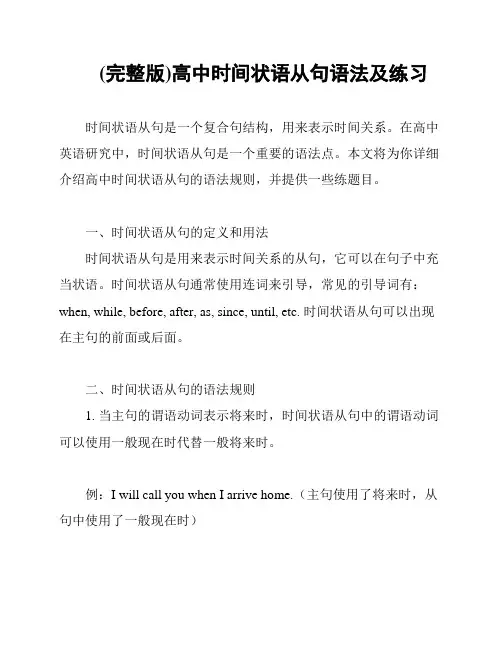
(完整版)高中时间状语从句语法及练习时间状语从句是一个复合句结构,用来表示时间关系。
在高中英语研究中,时间状语从句是一个重要的语法点。
本文将为你详细介绍高中时间状语从句的语法规则,并提供一些练题目。
一、时间状语从句的定义和用法时间状语从句是用来表示时间关系的从句,它可以在句子中充当状语。
时间状语从句通常使用连词来引导,常见的引导词有:when, while, before, after, as, since, until, etc. 时间状语从句可以出现在主句的前面或后面。
二、时间状语从句的语法规则1. 当主句的谓语动词表示将来时,时间状语从句中的谓语动词可以使用一般现在时代替一般将来时。
例:I will call you when I arrive home.(主句使用了将来时,从句中使用了一般现在时)2. 当主句的谓语动词表示过去时,时间状语从句中的谓语动词可以使用一般过去时或过去完成时代替。
例:She had finished her homework before she went to bed.(主句使用了过去时,从句中使用了过去完成时)3. 当时间状语从句表示一个惯性的动作或一个客观事实时,从句中的谓语动词可以使用一般现在时。
例:I always go for a walk when it is sunny.(从句中表示惯性的动作)三、时间状语从句的练题目1. 选择正确的连词填空:― She fell asleep _______ she finished her book.1) while 2) because 3) after― We will start the meeting _______ everyone ar rives.1) before 2) since 3) until2. 改写句子,将主句的谓语动词改为表示将来时:― I will call you when I have time.3. 改写句子,将主句的谓语动词改为表示过去时或过去完成时:― He went to bed before he finished his work.以上是关于高中时间状语从句的语法规则及练习题目的详细介绍。
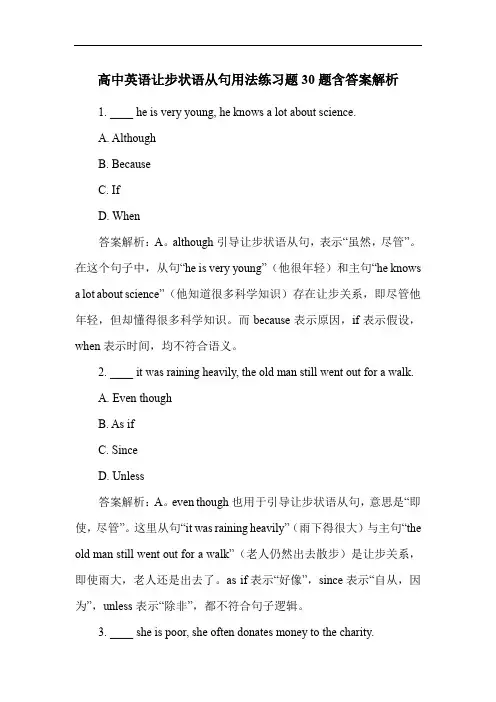
高中英语让步状语从句用法练习题30题含答案解析1. ____ he is very young, he knows a lot about science.A. AlthoughB. BecauseC. IfD. When答案解析:A。
although引导让步状语从句,表示“虽然,尽管”。
在这个句子中,从句“he is very young”(他很年轻)和主句“he knows a lot about science”(他知道很多科学知识)存在让步关系,即尽管他年轻,但却懂得很多科学知识。
而because表示原因,if表示假设,when表示时间,均不符合语义。
2. ____ it was raining heavily, the old man still went out for a walk.A. Even thoughB. As ifC. SinceD. Unless答案解析:A。
even though也用于引导让步状语从句,意思是“即使,尽管”。
这里从句“it was raining heavily”((雨下得很大)与主句“the old man still went out for a walk”(老人仍然出去散步)是让步关系,即使雨大,老人还是出去了。
as if表示“好像”,since表示“自从,因为”,unless表示“除非”,都不符合句子逻辑。
3. ____ she is poor, she often donates money to the charity.A. ThoughB. WhileC. UntilD. After答案解析:A。
though引导让步状语从句,意为“虽然”。
从句“she is poor”(她很穷)与主句“she often donates money to the charity”(她经常向慈善机构捐款)是让步关系,虽然她穷,但还经常捐款。
while 表示“当……时候,然而”,until表示“直到”,after表示“在……之后”,均不合适。
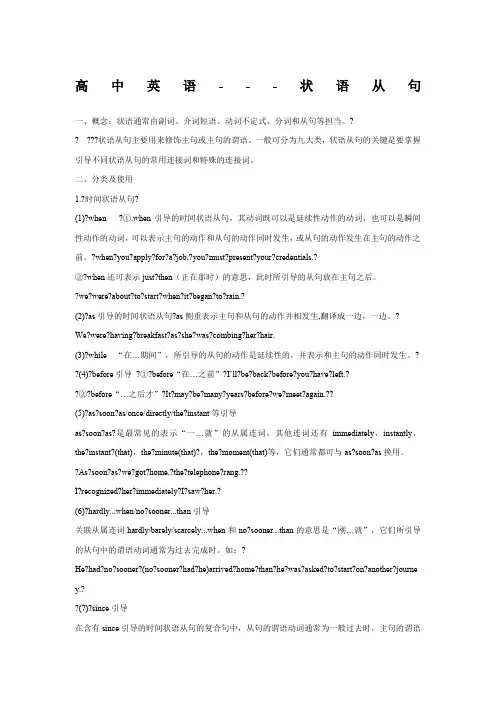
高中英语---状语从句一、概念:状语通常由副词、介词短语、动词不定式、分词和从句等担当。
?? ???状语从句主要用来修饰主句或主句的谓语。
一般可分为九大类,状语从句的关键是要掌握引导不同状语从句的常用连接词和特殊的连接词。
二、分类及使用1.?时间状语从句?(1)?when ?①.when引导的时间状语从句,其动词既可以是延续性动作的动词,也可以是瞬间性动作的动词,可以表示主句的动作和从句的动作同时发生,或从句的动作发生在主句的动作之前。
?when?you?apply?for?a?job,?you?must?present?your?credentials.?②?when还可表示just?then(正在那时)的意思,此时所引导的从句放在主句之后。
?we?were?about?to?start?when?it?began?to?rain.?(2)?as引导的时间状语从句?as侧重表示主句和从句的动作并相发生,翻译成一边,一边。
? We?were?having?breakfast?as?she?was?combing?her?hair.(3)?while “在…期间”,所引导的从句的动作是延续性的,并表示和主句的动作同时发生。
? ?(4)?before引导?①?before“在…之前”?I’ll?be?back?before?you?have?left.??②?before“…之后才”?It?may?be?many?years?before?we?meet?again.??(5)?as?soon?as/once/directly/the?instant等引导as?soon?as?是最常见的表示“一…就”的从属连词,其他连词还有immediately,instantly,the?instant?(that),the?minute(that)?,the?moment(that)等,它们通常都可与as?soon?as换用。
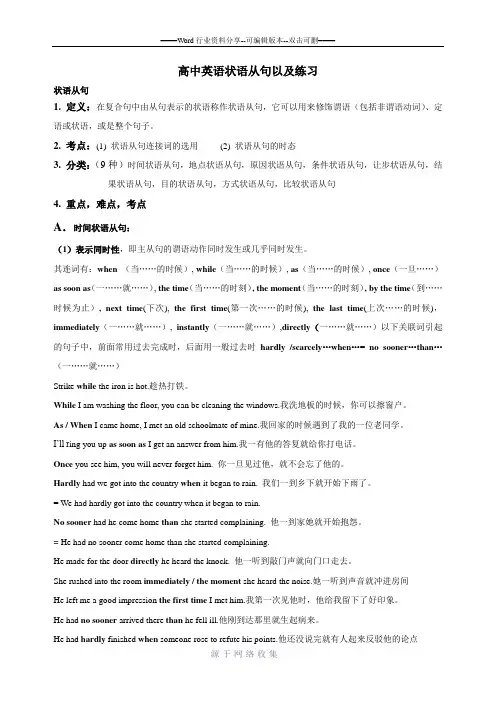
高中英语状语从句以及练习状语从句1. 定义:在复合句中由从句表示的状语称作状语从句,它可以用来修饰谓语(包括非谓语动词)、定语或状语,或是整个句子。
2. 考点:(1) 状语从句连接词的选用(2) 状语从句的时态3. 分类:(9种)时间状语从句,地点状语从句,原因状语从句,条件状语从句,让步状语从句,结果状语从句,目的状语从句,方式状语从句,比较状语从句4. 重点,难点,考点A.时间状语从句:(1)表示同时性,即主从句的谓语动作同时发生或几乎同时发生。
其连词有:when (当……的时候), while(当……的时候), as(当……的时候), once(一旦……)as soon as(一……就……), the time(当……的时刻), the moment(当……的时刻), by the time(到……时候为止), next time(下次),the first time(第一次……的时候),the last time(上次……的时候),immediately(一……就……),instantly(一……就……),directly(一……就……)以下关联词引起的句子中,前面常用过去完成时,后面用一般过去时hardly /scarcely…when…= no sooner…than…(一……就……)Strike while the iron is hot.趁热打铁。
While I am washing the floor, you can be cleaning the windows.我洗地板的时候,你可以擦窗户。
As / When I came home, I met an old schoolmate of mine.我回家的时候遇到了我的一位老同学。
I’ll r ing you up as soon as I get an answer from him.我一有他的答复就给你打电话。
Once you see him, you will never forget him. 你一旦见过他,就不会忘了他的。
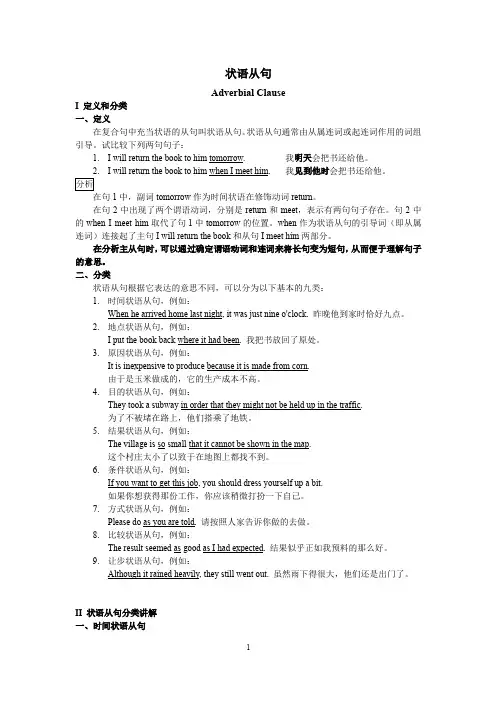
状语从句Adverbial ClauseI 定义和分类一、定义在复合句中充当状语的从句叫状语从句。
状语从句通常由从属连词或起连词作用的词组引导。
试比较下列两句句子:1.I will return the book to him tomorrow. 我明天会把书还给他。
2.I will return the book to him when I meet him. 我见到他时会把书还给他。
分析在句1中,副词tomorrow作为时间状语在修饰动词return。
在句2中出现了两个谓语动词,分别是return和meet,表示有两句句子存在。
句2中的when I meet him取代了句1中tomorrow的位置。
when作为状语从句的引导词(即从属连词)连接起了主句I will return the book和从句I meet him两部分。
在分析主从句时,可以通过确定谓语动词和连词来将长句变为短句,从而便于理解句子的意思。
二、分类状语从句根据它表达的意思不同,可以分为以下基本的九类:1.时间状语从句,例如:When he arrived home last night, it was just nine o'clock. 昨晚他到家时恰好九点。
2.地点状语从句,例如:I put the book back where it had been. 我把书放回了原处。
3.原因状语从句,例如:It is inexpensive to produce because it is made from corn.由于是玉米做成的,它的生产成本不高。
4.目的状语从句,例如:They took a subway in order that they might not be held up in the traffic.为了不被堵在路上,他们搭乘了地铁。
5.结果状语从句,例如:The village is so small that it cannot be shown in the map.这个村庄太小了以致于在地图上都找不到。
高考英语语法复习状语从句知识讲解一、概述常见的有although/though/even though引导的让步状语从句。
if/unless引导的条件状语从句。
until/when/while/as soon as引导的时间状语从句。
because引导的原因状语从句,so that引导的目的状语从句等。
if引导的条件状语从句和when引导的时间状语从句一般都会和时态相结合,即主要考查“主将从现”原则。
对于状语从句的学习可与专题六从属连词相结合。
在时间状语从句和条件状语从句中,主句和从句的时态一致问题一般有两种情况:(1)“主将从现”:主句用一般将来时,而从句用一般现在时。
常见的使用“主将从现”原则的连词有:表示时间的when, while, after, before, until, till, whenever, as soon as, as long as, once 等;表示条件的if, unless, so long as, in case等。
(2)“主祈从现”:若主句是祈使句,或主句中有情态动词时,那么从句用一般现在时表示将来。
(3)“主情从现”:若主句有情态动词, 那么从句用一般现在时表示将来。
如:You can get good grades if you study hard.如果你努力学习,你将取得好成绩。
状语从句由从属连词引导,与主句连接,位于句首时,常用逗号与主句分开,位于句末时,其前一般不用逗号。
状语从句根据其用途可分为时间状语从句、条件状语从句、原因状语从句、目的状语从句、结果状语从句、让步状语从句、比较状语从句、地点状语从句等。
二、时间状语从句(1)当主句是一般将来时态或祈使句,表示将来的意义时,从句通常用一般现在时,简称“主将从现”。
I’ll ring you up as soon as I get to Beijing.我一到北京就给你打电话。
(2) when引导的时间状语从句,通常表示主句和从句的动作同时发生;before表示主句的动作发生在从句的动作之前;after则表示主句的动作发生在从句的动作之后;as引导时间状语从句时,往往表示主句和从句的动作同时发生,不分先后。
状语从句状语从句在句子中可修饰谓语、形容词或是整个句子,它可以用来表示时间、地点、原因、目的、结果、条件、方式、比较、让步等。
一、时间状语从句可由when, as, while, after, before, till(until), since, by the time, once, as soon as, the moment引导When I came into the office, the teachers were having a meeting.He started as soon as he received the news.Once you see him, you will never forget him.注意:not…until的用法和强调句结构。
如:I didn’t realize that I had left my key in the office until I arrived home.It was not until I arrived home that I realized that I had left my key in the office.在hardly/scarcely…when… , no sooner…than…句式中,把hardly/scarcely/no sooner置于句首时,第一个分句采用部分倒装语序。
第一个分句用过去完成时,第二个分句用一般过去时Hardly had he sat down when there was a knock at the door.No sooner had I gone to bed than I went to sleep.二、原因状语从句原因状语从句时表示原因或理由的,引导这类从句的最常用的是because, since, as, now that等,for表示因果关系时为并列连词,常位于句尾,其前有逗号,语气最弱。
2.原因状语从句原因状语从句表示主句中动作或状态发生的原因或理由, 可位于主句之前,之后或插在主句中间。
主句表示结果, 从句表示原因, 主要由because, as, since, for,seeing ( that), considering ( that), now (that), in that, not ... because 等引导。
1) because“因为’’, as‘‘由于”, since “既然”, for“因为”because意为“因为”, 表示直接的原因或理由, 着重点在从句, 用于回答why,语气最强。
He is absent today because he is ill.当主句为否定句时, 从句because须用逗号与主句隔开, 否则容易引起歧义。
I didn’t visit him, because I wanted to borrow some books.我没去拜访他, 因为我想借几本书。
I didn’t visit him because I wanted to borrow some books.我不是因为想借几本书才去拜访他的。
as意为“由于”, 表示十分明显的原因, 所引导的从句常位于主句之前, 有时也可位于主句之后, 一般说明因果关系, 着重点在主句, 原因或理由只是附带说明, 不用于回答why的问题, 常用于口语。
As it is snowing, we shall not go to the park.As this book is written in simple English, it is suitable for beginners.since意为“既然, 由于”时表示对方已知的、无须加以说明的既成事实的理由, 只是一个附带说明。
since = as it is the fact that ...全句中心在主句。
如从句表示的原因不是确定的事实, 就不能用since,通常用because.Since everybody is here, let’s begin our discussion.Since you seem to know them, why don’t you introduce me to them?for是一个并列连词, 由for连结的表原因的句子常看作并列句, 它只提供一些补充说明或对前一个分句加以解释, 不可前置。
高中英语状语从句练习与讲解状语从句状语从句在句中相当于副词做状语,又叫副词性从句。
状语从句分为时间状语从句、条件状语从句、地点状语从句、原因状语从句、目的状语从句、让步状语从句、结果状语从句和比较状语从句。
掌握状语从句应当引导词入手,注意引导词的词义,引导状语从句的引导词都有词思,所以,了解引导词的意思尤为重要。
引导词按意义分为九类:1)时间when , as , while , till , until , before, after , since2)地点where3)原因because , as , since , now that4)条件if , unless , once .so (as)long as . in case5)让步though , whatever (--ever) as, even though, even if6)目的so that, in order that7)结果so ... that8)比较than, as .. as9)方式as , as if例如:1.I fell asleep when ( as , while ) he was doing his exercises .他正作练习时我睡着了。
(时间状语从句)2.When he arrived in Shanghai , his mother met him at the station .他到上海时,他妈妈到车站接他。
(时间状语从句)3.She always sings as she walks .她总是一边走一边唱。
(时间状语从句)4.I waited until he had finished his work .我等到他做完活。
(时间状语从句)5.It was not long before he told me about this affair .不久,他就告诉我这件事。
(时间状语从句)6.He has worked very hard since he entered the factory .自从他进厂,工作一直很努力。
1. Tim is in good shape physically he doesn't get much exercise.A. ifB. even thoughC. unlessD. as long as2. The school rules state that no child shall be allowed out of the school during theday, ______accompanied by an adult.A. onceB. whenC. ifD. unless3.you may have, you should gather your courage to face the challenge.A. However a serious problemB. What a serious problemC. However serious a problemD. What serious a problem4.Because of the heavy traffic,it was already time for lunch break she got to heroffice.A.since B.that C.when D.untilJohn thinks it won’t be long he is ready for his new job.A. whenB. afterC. beforeD. since6. Today, we will begin ________we stopped yesterday so that no point will be left out.A. whenB. whereC. howD. what7. She had just finished her homework her mother asked her to practice playing the piano yesterday.A. whenB. whileC. afterD. since8. My parents don’t mind what job I do I am happy.A. even thoughB. as soon asC. as long asD. as though9. You can’t borrow books from the school library ______ you get your student card.A. beforeB. ifC. whileD. as10. All the dishes in this menu, otherwise stated, will serve two to three people.A. asB. ifC. thoughD. unless11.Because of the financial crisis, days are gone _ _ local 5-star hotels charged 6,000 yuan for one night.A. ifB. whenC. whichD. since12. __ unemployment and crime are high, it can be assumed that the latter is due to the former.A. BeforeB. WhereC. UnlessD. Until13.—Did you return Fred’s call?—I didn’t need to ____I’ll see him tomorrow.A. thoughB. unlessC. whenD. because14.I’m sorry you’ve been waiting so long,but it’ll still be some time ____Brian gets back.A. beforeB. sinceC. tillD. after15.We’ll have a picnic in the park this Su nday _____ it rains or it’s very cold.A.sinceB. ifC. unlessD. until16.in the fields on a March afternoon,he could feel the warmth of spring. A.To walk B.Walking C.Walked D.Having walked17.Nancy enjoyed herself so much she visited her friends in Sydney last year.A.thatB.whichC.whenD.where18.You’d better not leave the medicine kids can get at it.A.even ifB.whichC.whereD.so that19. I won’t call you,something unexpected happens.A.unlessB.whetherC.becauseD.while—I brought it to you you were in Mr. Black’s office yesterday.A.ifB.whenC.becauseD.before21.Most brids find it safe to sleep in the trees,but they have eggs or young chicks,theydon’t use a nest.A.whyB.howC.unlessD.where22.—when has the country been open to international trade?—1978,I suppose.A.SinceB.InC.FromD.After23.My parents live in a small village.They always keep candles in the house there is a power out.A.ifB.unlessC.in caseD.so that24.Many of them turned a deaf ear to his advice,they knew it to be valuable.A.as ifB.now thatC.even thoughD.so that25.I really don’t like art,I find his work impressive.A.AsB.SinceC.IfD.While26.you’ve tried it,you can’t imagine how pleasant it is.A.UnlessB.BecauseC.AlthoughD.When27.If you are traveling the customs are really foreign to your own,please do as the Romans do.A.in whichB.whatC.whenD.where28.In time of serious accidents,we know some basic things about first aid,we can save lives.A.whetherB.untilC.ifD.unless29.How can you expect to learn anything you never listen?A.in caseB.even ifC.unlessD.when30.In peace,too,the Red Cross is expected to send help there is human suffering.A.whoeverB.howeverC.whateverD.wherever1.After living in Paris for fifty years he returned to the small town __________ he grew up as a child. (NMET 1996)A.WhichB.ThatC.WhereD.when2.Carol said the work would be done by October, __________ personally I doubt very much. (NMET 1999)A.ItB.ThatC.WhenD.which3.Dorothy was always speaking highly of her role in the play, __________, of course, made the others unhappy. (NMET 2000)A.WhoB.WhichC.ThisD.what4.__________ is known to everybody, the moon travels round the earth once every month. (NMET 2001)A.ItB.AsC.ThatD.What5.The film brought the hours back to me __________ I was taken good care of in that far-a way village. (NMET2001)6.__________ is mentioned above, the number of the students in senior school is increasing. (1994上海卷)A.WhichB.AsC.ThatD.It7.In the office I never seem to have time until after 5:30 p.m., __________ many people ha ve got home. (1995上海卷)A.whose timeB.ThatC.on whichD.by which8.All of the flowers now raised here have developed from those __________ in the forest. (1997上海卷)A.once they grewB.they grew onceC.they once grewD.once grew9.He made another wonderful discovery, __________ of great importance to science. (1998上海卷)A.which I think isB.which I think it isC.which I think itD.I think is10.He was very rude to the Customs officer, __________ of course made things even worse. (1999上海卷)A.whoB.WhomC.whatD.which11.Recently I bought an ancient Chinese vase, __________ was very reasonable. (2000上海卷)A.which priceB.the price of whichC.its priceD.the price of whose12.He’s got himself into a dangerous situation __________ he is likely to lose control over t he plane. (2001上海卷)A.WhereB.WhichC.whileD.why13.I can think of many cases __________ students obviously knew a lot of English words a nd expressions but couldn’t write a good essay. (2003上海卷)A.WhyB.WhichC.AsD.where14.The gentleman __________ you told me yesterday proved to be a thief. (2000上海春)A.WhoB.about whomC.whomD.with whom15.It was an exciting moment for these football fans this year, __________ for the first time in years their team won the World Cup. (2000北京春)A.ThatB.WhileC.WhichD.when16.The result of the experiment was very good, __________ we hadn’t expect. (2000北京春)A.WhenB.ThatC.WhichD.what17.Have you seen the film Titanic, __________ leading actor is world famous? (2001上海春)A.ItsB.it’sC.whoseD.which18.John said he’d been working in the office for an hour, __________ was true. (2001北京春)19.Is this the reason __________ at the meeting for his carelessness in his work? (2002上海春)A.he explainedB.what he explainedC.how he explainedD.why he explained20.The famous basketballer, __________ tried to make a comeback, attracted a lot of attentio n. (2002北京春)A.WhereB.WhenC.WhichD.who21.We are living in an age __________ many things are done on computer. (2003北京春)A.WhichB.ThatC.WhoseD.when22.We will be shown around the city: schools, museums, and some other places, __________ other visitors seldom go. (2002北京)A.whatB.WhichC.WhereD.when23.York, __________ last year, is a nice old city. (2003北京)A.that I visitedB.which I visitedC.where I visitedD.in which I visited24.Luckily, we'd brought a road map without __________ we would have lost our way. (200 4北京春)A.itB. ThatC.thisD.which25.The journey around the world took the old sailor nine months, __________ the sailing ti me was 226 days. (2004广西卷)A.of whichB.during whichC.from whichD.for which26.The factory produces half a million pairs of shoes every year, 80% __________are sold a broad. (2004辽宁卷)A.of whichB.which ofC.of themD.of that27.There are two buildings, __________stands nearly a hundred feet high. (2004湖北卷)A.the largerB.the larger of themC.the larger one thatD.the larger of which28.The English play __________ my students acted at the New Year’s party was a great suc cess. (2004全国卷)A.for whichB.at whichC.in whichD.on which1答案:B解析:句意:“尽管Tim不经常锻炼,但他身材很好。
高考英语状语从句讲解
知识要点:
状语从句是副词性从句,它在句子中担任状语,修饰主句的动词、形容词或副词。
根据修饰的方面,状语从句可以分为以下九种。
1、时间状语从句
2、地点状语从句
3、原因状语从句
4、目的状语从句
5、结果状语从句
6、条件状语从句
7、方式状语从句8、让步状语从句9、比较状语从句
1
运用状语从句应注意的几个问题:
1)状语从句中用一般现在时代替一般将来时
2)because不与so连用,表示"因为...所以"二者只能选择其一;though ( although )不与but连用,表示"虽然...但是" ,二者只能选择其一.
3)同一引导词可以引导不同种类的从句.如: where
You'll find it where it was .(地点状语从句)Tell me the address where he lives . (定语从句)
I don't know where he came from . (宾语从句)Where he has gone is not known yet . (主语从句)
This is where they once lived . (表语从句)since , as, when也分别可以引导不同种类的从句.。
状语从句状语从句在句中相当于副词做状语,又叫副词性从句。
状语从句分为时间状语从句、条件状语从句、地点状语从句、原因状语从句、目的状语从句、让步状语从句、结果状语从句和比较状语从句。
掌握状语从句应当引导词入手,注意引导词的词义,引导状语从句的引导词都有词思,所以,了解引导词的意思尤为重要。
引导词按意义分为九类:1)时间when , as , while , till , until , before, after , since2)地点where3)原因because , as , since , now that4)条件if , unless , once .so (as)long as . in case5)让步though , whatever (--ever) as, even though, even if6)目的so that, in order that7)结果so ... that8)比较than, as .. as9)方式as , as if例如:1.I fell asleep when ( as , while ) he was doing his exercises .他正作练习时我睡着了。
(时间状语从句)2.When he arrived in Shanghai , his mother met him at the station .他到上海时,他妈妈到车站接他。
(时间状语从句)3.She always sings as she walks .她总是一边走一边唱。
(时间状语从句)4.I waited until he had finished his work .我等到他做完活。
(时间状语从句)5.It was not long before he told me about this affair .不久,他就告诉我这件事。
(时间状语从句)6.He has worked very hard since he entered the factory .自从他进厂,工作一直很努力。
(时间状语从句)7.After he had finished the work , he went home .他干完活,回家了。
(时间状语从句)8.Where there is a will,there is a way .有志者,事竟成。
(地点状语从句)9.She didn't come to school because she was ill .她由于有病没来上学。
(原因状语从句)10.As he did not know much English , he looked up the word in the dictionary .由于他不懂什么英语,所以查字典。
(原因状语从句)11.Now that ( Since ) I've told you twice , you must know it .既然我告诉你两次了,你必须记住。
(原因状语从句)12.Once he says that , he will do it .一旦他说了,他就会做。
(条件状语从句)13.Unless I receive the letter from him , I won't write to him again .如果我不收到他的信,就不给他写回信。
(条件状语从句)14.So long as you work hard , you are sure to succeed .只要你努力工作,就一定能成功。
(条件状语从句)15.Thoughwewere neither very big nor very strong , we were a good team .虽然我们个儿不大,身体不壮,但是个好队。
(让步状语从句)16.No matter who she is , she'll have to wait .无论她是谁,也得等。
(让步状语从句)17.Poor as he was , he was honest .虽然他很穷,但很诚实。
(让步状语从句)18.It also shows you the caller's telephone numberin order that you can recognize who it is .它能向你显示打电话人的号码以便能够认出是谁。
(目的状语从句)19.He was so excited that he could not say a word .他如此激动以至于说不出话来。
(结果状语从句)20.He works as hard as he used to .他工作与过去一样努力。
(方式状语从句)21.You must do as I told you .你必须按我告诉你的去做。
(方式状语从句)运用状语从句应注意的几个问题:1)状语从句中用一般现在时代替一般将来时2)because不与so连用,表示"因为...所以"二者只能选择其一;though ( although )不与but连用,表示"虽然...但是" ,二者只能选择其一.3)同一引导词可以引导不同种类的从句.如: whereYou'll find itwhere it was .(地点状语从句)Tell me the addresswhere he lives . (定语从句)I don't knowwhere he came from . (宾语从句)Where he has goneis not known yet . (主语从句)This is where they once lived . (表语从句)since , as, when也分别可以引导不同种类的从句.练习题I .填入适当的引导词1. I haven't heard from him _____ he went to America .2.He won't be here _____ he is invited .3. He will not go to the cinema _____ he is very busy .4. We found the key _____ she lad left it .5. We found the books two days ____ he had gone away .6. We had no sooner got to the station _____ the train left .7. He speaks English ______ he were an Englishman .8.He is explaining clearly _______ they could understand .9. Do not leave the room _____ you have finished the test .10. She sang ______ she went along .答案:1.since 2.unless 3.because 4.where 5.after 6.than 7.as if8.so that9.before 10.asII.改错1. The children were running on the playground as fast as they can .2.Since her husband had died , so she had to supporther family .3.He won't go out until his mother will come .4.He was very foolish that he didn't pass such an easy exam .5.Tom had gone out as soon as his mother got home .6.It was three months since he came to our school .7.The playground of our school is larger than their school .8.The streets in Nanjing are wider than Shanghai .9.Whatever there is plenty of sun and rain , the fields are green .10. She singssongsas ifshe is a bird .答案:1. can改为could 2.去掉so 3.will come改为comes 4. very改为so 5.as soon as改为when 6.was改为is 7.than 之后加上that of8.than后加those in9.whatever改为wherever 10. is改为wereIII.找出从句并指出是那类从句1. It depends on whether we have enough time .2.The question he asked was where the electrical equipment should be stored.3. The mountain is no longer what it used to be .4. The fact that she works hard is well known to us all .5. He wasnotthe man that he was before .6. Nowyou was free , why not go swimming with us ?7. Where there are schools and colleges , there are examinations .8. Bad habits , once firmed , are difficult to give up .9.She often wears the same kind of skirt as her twin sister does .10 .The moment he opened the window , a bird flew in .答案:1.whether we have enough time介词宾语从句2.he asked定语从句where the electrical equipment should be stored表语从句3.what it used to be表语从句4. that she works hard同位语从句5. that he was before定语从句6.Nowyou was free让步状语从句now= now that7.Where there are schools and colleges地点状语从句8. once firmed时间状语从句9. as her twin sister does定语从句10.The moment he opened the window时间状语从句IV.填入适当的引导词完成句子1.____ will do the experiment comes to the professor's office .2. ___ will do the experiment hasn't been decided .3. The teacher didn't leave ______ twelve o'clock .4. ______ the day went on , the weather got worse .5. _____ she is young , she knows quite a lot .6.It worried her a bit ____ her hair was turning grey .7. You will be late ____ you leave immediately.8.Go and get your coat . It's ______ you left it .9.______ is mentioned above , the number of the students in senior high schools is increasing .10. ____ had I entered the room ____ the phone rang .答案:1.Whoever 2. Who 3.until 4.As 5.Although 6.that 7.unless 8.where 9.As 10 Hardly, when ( No sooner , than )V.改错1.Is this the watch for which he is looking now ?2. This is all which I can do for you .3.Do you know the old man at the back of the room, whom has been chosen head of the factory .4. I want to know the way which you learn new words .5. Can you tell me that there's a bookstore near here ?6. Our school quite different from that it was before .7. If she likes the present is not clear to me .8.For she is ill , shehasn't come to school .9. It gave him so a big shock that his face turned pale .10. He is cleverer than any boy in his class .答案:1.for放在looking之后2.which改为that3.whom改为who 4.which改为how 5.that改为whether 6.that改为what 7.If改为Whether 8.For改为Because 9.so改为such 10.any后加other。